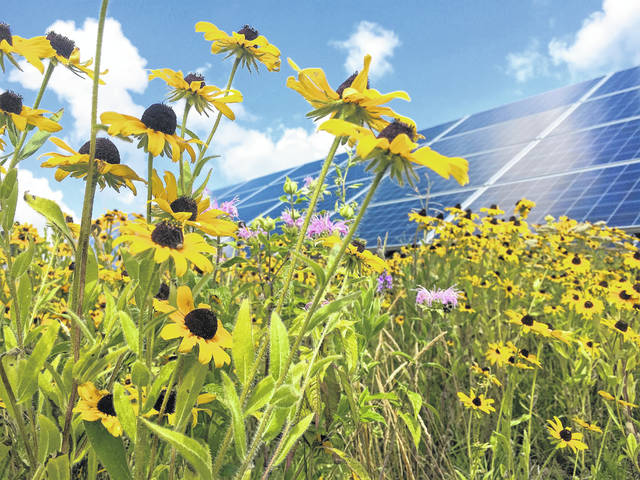
With local discussions fresh in mind on the merits of building a pair of solar power generating farms in southern Highland County, a company in Pennsylvania has a concept which combines the idea of clean, renewable solar power with a plan to help with declining honey bee populations.
Robin Ernst is president of Ernst Pollinator Service of Meadville, Pa., and she described to The Times-Gazette her company’s idea of aiding the honey bee population which, according to the U.S. Department of Agriculture, has been in decline since the 1940s.
“What we are trying to do is bring in the native pollinators, which are the flowers and the native grasses, to the sites,” she said. “A lot of your natives are what was here during frontier days, and on our 10,000 acre farm here on the east coast we supply to a lot of projects that involve wetlands, streams, meadows and now these solar panel farms.”
Solar power generating farms have been the subject of ongoing discussions since American Electric Power’s announcement last fall of plans to build a pair of installations in southern Highland County.
A public hearing by the Ohio Power Siting Board was held Tuesday evening at Bright Elementary School at Sugar Tree Ridge. Those attending heard public comment on Open Road LLC’s proposed Willowbrook solar farm, a 100-megawatt installation.
Whatever the local sentiment concerning the solar panel farms, Ernst said the large arrays provide a unique opportunity to help foster the growth of bee colonies, which the USDA says perform about 80 percent of pollination worldwide.
“The idea for this came from the fact that we’re seeing declining populations of insect pollinators like bees and butterflies,” she said. “When I’m out mowing grass I get excited when I see a monarch butterfly since they could be the next thing placed on the endangered species list.”
The USDA said that a single bee colony can pollinate 300 million flowers each day, and that while grains are primarily pollinated by the wind, fruits, nuts and vegetables are pollinated solely by bees.
They are responsible for pollination of approximately one-third of the United States’ crop species, which locally includes peaches, apples, pears, cherries, raspberries, blackberries, cranberries, watermelons, cantaloupes, cucumbers and strawberries.
“There is a great need to create habitats for our pollinators that we’ve lost over the years due to development,” Ernst said, “and those same pollinators help with agricultural production in neighboring farm land, and with these panel farms occupying thousands of acres, this is a great avenue of keeping them productive even when they’ve been taken out of direct crop production.”
The process is simple, she said, in that her company works with its sister firm, Ernst Seeds, and grows what are called “eco-types,” or plants grown from seed that came from harvested native plants in the region in question.
At the engineering level, they work with the developer to establish plant life native to the area, which she said establishes good soil stabilization and tends to lower operations and maintenance costs at the installation.
“We have found over the 20 years that we’ve been doing stream and wetland work that operating and maintenance costs can be cut dramatically,” she said. “It reduces the amount of mowing that has to be done, and reduces the use of herbicides and adding fertilizers to the soil, because they’re not just using basic grasses that don’t have the root depth that native plants have.”
As an illustration, she said typical turf grass has roots that are only three to six inches deep, but native vegetation such as purple prairie clover, buffalo grass and pale purple coneflower have root systems that extend up to four feet below the surface, which helps prevent erosion and prepares the land for eventual future use.
Ernst said that while some people see only an eyesore or a loss of productive farm land, her company appreciates the small farmer trying to hold onto third and fourth generation land, and when they lease the land to developers for solar panel farms, families have the ability to keep the land in the family and provide a habitat where pollinators can thrive.
Both the proposed Willowbrook and Hecate installations have a 20-year power purchase agreement that at the end, depending on the progress of photovoltaic technology, the equipment could be dismantled and the land returned to its original use. Ernst said if that happened, it would be more ready for farming.
“This will help to create better soils since there is more organic matter in the ground,” she said. “So let’s say that 20 years down the road this land reverts back to agriculture, and people will find that the land has been improved without the use of chemicals and additives, but with actual native plant vegetation.”
She said that although her company hasn’t contacted Open Road Renewables or Hecate Highland Energy, another company they work with inquired as to whether Ernst Pollinator Service would come to Ohio to create the unique solar farm habitats, which she said they would.
Ernst said she was planning to attend the next Ohio Power Siting Board hearing scheduled for Tuesday, March 19 from 6-8 p.m. at Whiteoak High School, so that those for and against the 300-megawatt Hecate solar panel farm, planned for construction north of Mowrystown, can express their opinions.
Reach Tim Colliver at 937-402-2571.


